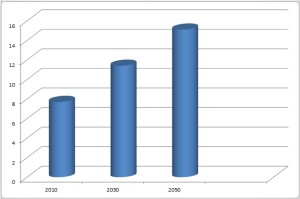Doxycycline Could Potentially Prevent Vision Loss in People Living With Type 1 Diabetes
A JDRF-funded study may help to identify an inexpensive treatment for diabetic retinopathy as well as an early biomarker for this common diabetes complication
It is estimated that 45 percent of Americans diagnosed with diabetes have some stage of diabetic retinopathy (DR), making it among the most prevalent complications of diabetes and a leading cause of adult blindness. Finding a way to prevent or delay development of DR—a condition caused by changes in blood vessels in the retina—is a major goal of JDRF’s complications therapy research. A new clinical trial is providing hope that a common antibiotic may be useful in preventing this eye disease.
The study published in the on-line first edition of JAMA Ophthalmology, was funded in part by a grant from the Penn State-JDRF Center for Mechanism and Intervention of Diabetic Retinopathy under the leadership of former director, Thomas Gardner, MD, MS. It looked at whether doxycycline, an inexpensive generic antibiotic, could delay or prevent deterioration of certain eye functions that may contribute to DR. Researchers at Penn State Hershey Eye Center and Denmark’s Glostrup Hospital followed 30 type 1 diabetes (T1D) patients who were randomized into two groups: one receiving 50 mg of doxycycline daily and the other placebo (inert pills). By the end of the 24 month trial, half the patients receiving doxycycline experience improved sensitivity in their fovea—a nerve-concentrated region of the retina—but none of the patients receiving placebo experienced this improvement.
Projected Incidence of Diabetic Retinopathy (in millions)

Investigators are uncertain how doxycycline may work to improve or prevent foveal deterioration—which may contribute to DR—but they hypothesize that the drug may stave off nerve-damaging inflammation and prevent glucose swings from harming cells within the eye.
While foveal sensitivity is not a measure of visual acuity, investigators believe that it may prove to be a good predictor of DR damage and potential vision loss. Additional clinical trials are needed, however, to determine whether foveal damage is a biomarker for vision loss and, if so, whether taking doxycycline or other similar drugs can help T1D patients avoid this complication.
To learn more about or to support JDRF’s T1D Complications Research Program visit here.
Scott, Ingrid MD, MPH (et. al),”Effect of Doxycycline vs Placebo on Retinal Function and Diabetic Retinopathy Progression in Patients With Severe Nonproliferative or Non-High-Risk Proliferative Diabetic Retinopathy: A Randomized Clinical Trial” Jama Ophthalmology, March 6 2014, pgs. E1-E9.